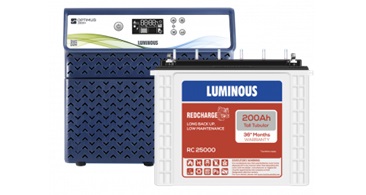The increasing frequency of power blackouts has become a growing concern in various parts of the world, disrupting daily life and causing economic setbacks. These outages often result from a combination of factors, including ageing infrastructure, extreme weather events, and increasing energy demands. In such circumstances, the importance of reliable power sources cannot be overstated.
A reliable power supply is important for sustaining essential services, maintaining communication networks, and ensuring the smooth functioning of essential infrastructure. Amidst these challenges, lithium batteries emerge as a promising solution to address power outage concerns. These advanced energy storage systems offer a reliable and efficient means of storing electricity, providing a lifeline during blackouts and contributing to the development of resilient and sustainable energy ecosystems.
The role of lithium batteries in enhancing energy security and mitigating the impact of power disruptions is a topic of increasing interest and significance in our modern, interconnected world. Read on further to understand more about the lithium battery for inverter and why to choose these batteries for your inverters.

Lithium Battery for Inverter
Lithium-ion batteries are commonly used as energy storage solutions for inverters, providing a reliable and efficient power source. Here are some key points about using lithium-ion batteries for inverters:
1. Compatibility with Inverters:
- Voltage Compatibility: Lithium-ion batteries can be designed to provide the required voltage for common inverter applications. It’s essential to ensure that the battery voltage matches the inverter specifications for proper functioning.
- Inverter Charger Compatibility: Some inverters come with built-in chargers explicitly designed for lithium-ion batteries, ensuring efficient charging and discharging processes.
2. BMS (Battery Management System): Lithium-ion batteries require a Battery Management System (BMS) to monitor and manage the charging and discharging processes. The BMS helps prevent overcharging over-discharging and ensures the complete safety and performance of the battery.
3. Capacity and Power Ratings: Inverter manufacturers often provide guidelines on the recommended capacity and power ratings for compatible lithium-ion batteries. It’s important to choose a battery that meets or exceeds the inverter’s requirements for optimal performance.
4. Safety Considerations: Safety is an essential factor when using lithium-ion batteries. Proper installation, handling, and maintenance are essential to prevent potential hazards such as overheating or fires. Following manufacturer recommendations and guidelines is crucial for ensuring safety.
5. Cost Considerations: While lithium-ion batteries may have a higher upfront cost compared to traditional batteries, their longer lifespan and superior performance can contribute to cost savings over the long term.
6. Environmental Impact: Lithium-ion batteries are generally more environmentally friendly compared to some other battery technologies. Proper disposal and recycling of batteries at the end of their life cycle are essential to minimise environmental impact.
Why Choose Lithium Battery for Inverter?
Lithium batteries are increasingly becoming popular choices for inverters due to several advantages they offer over traditional batteries. Here are some reasons why choosing lithium batteries for inverters can be advantageous:
- High Energy Density: Lithium batteries have a higher energy density compared to traditional batteries. This means they can stow more energy in a smaller and lighter package, making them more space-efficient and easier to handle.
- Longer Cycle Life: Lithium batteries generally have a longer cycle life than batteries used earlier. They can endure a higher number of charge-discharge cycles, which is beneficial for applications that require frequent cycling, such as backup power systems.
- Fast Charging and Discharging: Lithium batteries can be charged and discharged instantaneously as compared to earlier used batteries. This is particularly useful in applications where quick bursts of power are needed, as lithium batteries can respond rapidly to changes in demand.
- Lower Self-Discharge Rate: Lithium batteries have a lower self-discharge rate than traditional batteries. This means they can hold their charge for more extended periods, making them suitable for backup power applications where reliability is crucial.
- Compact and Lightweight: Lithium batteries are more compact and lightweight than batteries used earlier with similar energy storage capacity. This makes them easier to transport, install, and integrate into various applications, including inverter systems.
- Improved Efficiency: Lithium batteries generally have higher charge and discharge efficiency.. This means that more of the stored energy can be effectively utilised, resulting in better overall system efficiency.
- Maintenance-Free Operation: Lithium batteries require less maintenance. They do not need periodic watering, and there is no need to check or adjust electrolyte levels, which simplifies the maintenance routine for inverter systems.
- More comprehensive Operating Temperature Range: Lithium batteries typically have a wider operating temperature range. This makes them suitable for use in diverse environmental conditions, providing flexibility in deployment.
- Better Depth of Discharge (DoD): Lithium batteries can often be discharged to a higher percentage of their capacity without compromising their overall lifespan. This can be advantageous in scenarios where deep discharges are common.
- Advanced Battery Management Systems (BMS): Lithium batteries are often equipped with sophisticated Battery Management Systems that help monitor and control various aspects of the battery’s performance, ensuring safe and efficient operation.
Upgrade Your Backup Power: The Lithium Inverter Advantage
The persistent challenges posed by power blackouts can be effectively mitigated with the adoption of lithium batteries for inverters. The superior performance, longer lifespan, and faster charging capabilities of lithium batteries make them a reliable and efficient solution to power backup needs. For those seeking a reliable source of power during blackouts, the lithium battery for inverters emerges as a game-changer. Make the switch today and experience the difference. To explore the latest innovations in inverter technology, visit Luminous INBT and take the first step towards a more resilient and empowered future.
Santosh Kumar, the author behind IndiasStuffs.com, is passionate about sharing valuable insights on a variety of topics, including lifestyle, technology, and Indian culture.

